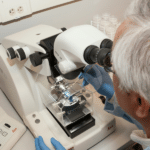In the bustling world of beauty and aesthetics, the conversation often revolves around the latest skincare regimes, makeup trends, and surgical advancements. Rarely do we delve into the less talked about, yet equally significant, topic of facial nerve pain — a condition that, although not predominantly known for its prevalence, can have profound effects on a woman’s life.
Facial nerve pain, often mistaken as a mere headache or dental ache, can be a debilitating condition. Dr. Babak Azizzadeh, a renowned facial plastic and reconstructive surgeon, sheds light on this medical enigma, explaining, “Most of the facial nerve function is focused on facial movement, so it’s rare to cause pain. Most facial nerve disorders lead to smile dysfunction.”
What is trigeminal neuralgia?
There’s a nerve known as the trigeminal nerve that can cause facial pain. When this nerve is afflicted, it results in trigeminal neuralgia. “This is a condition characterized by sudden, severe, electric shock-like or stabbing pain typically felt on one side of the face,” Dr. Azizzadeh describes. It’s a pain so fierce that the gentlest wind or a soft touch can trigger a torrent of discomfort, leaving those affected by it in dread of the next unpredictable episode.
While trigeminal neuralgia itself is relatively rare, its impact on women’s lives — who are more frequently diagnosed with the condition — is significant. Dr. Azizzadeh observes, “Chronic pain disorders can have a tremendous psychosocial impact on daily lives and activities.” The relentless nature of facial nerve pain can erode one’s concentration, incite panic attacks, and even lead to addiction due to reliance on pain medication. This cascade of challenges underscores the necessity for managed care under the vigilant eye of a pain specialist.
What causes facial nerve pain?
Beyond natural causes, facial nerve pain can be a byproduct of aesthetic pursuits. When discussing facial procedures, Dr. Azizzadeh acknowledges that, “Rarely, facial plastic surgery procedures may cause temporary or, in rare cases, chronic facial nerve pain.” This admission is particularly poignant in a society where the quest for youthful beauty often leads women to the operating table.
Complications from surgical interventions, such as facelifts, are not unheard of. The doctor points out that going to expert surgeons minimizes the risk of nerve pain through meticulous technique. In the realm of plastic surgery, experience and precision are paramount, as even a procedure not typically classified as “botched” can result in unwelcome side effects, including nerve pain.
Preventing & treating facial nerve issues
Early detection is crucial in mitigating the impact of facial nerve issues. “Facial nerve issues typically result in smile dysfunction as a result of weakness or asymmetry of facial muscle movements,” says Dr. Azizzadeh, advising that any such signs warrant immediate communication with a surgeon.
For those who suffer from the aftermath of a surgical intervention gone awry, hope is not lost. “Individuals with facial nerve disorders may undergo reconstructive surgery to restore both form and function to the affected areas of the face,” Dr. Azizzadeh explains. According to him, these corrective measures can address issues ranging from smile dysfunction to chronic pain.
In a culture that often celebrates external beauty, it’s essential to shine a light on the less visible, more painful experiences that many women endure in silence. Facial nerve pain is a serious medical condition that merits attention, understanding, and empathy. It’s a stark reminder that beneath the surface of every aesthetic choice and behind every smile, there may be an untold story of resilience against an invisible adversary.
For women navigating the complexities of facial nerve pain, Dr. Azizzadeh’s insights are not only a beacon of knowledge but also a source of solace. They affirm that their pain is real, their struggles are acknowledged, and perhaps most importantly, that solutions and support are available. In the end, the pursuit of beauty should never come at the cost of well-being, and awareness is the first step towards a future where women do not have to choose between the two.









